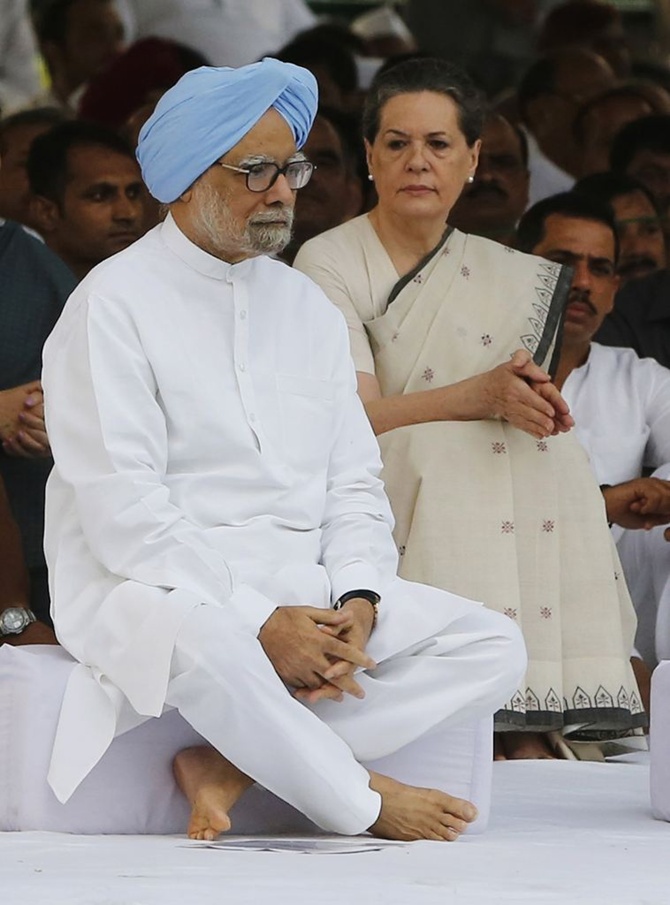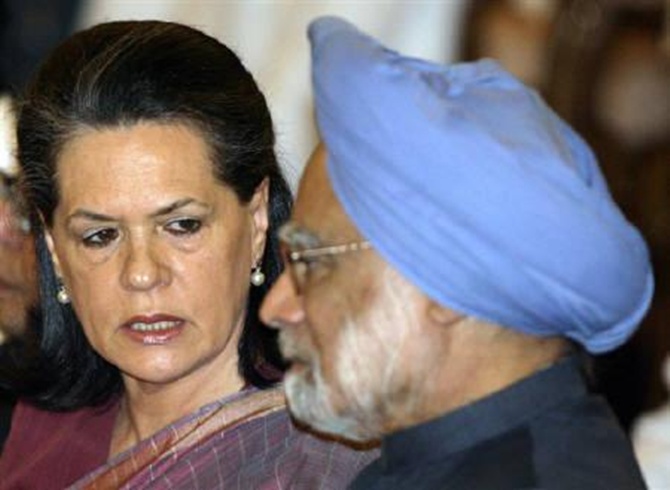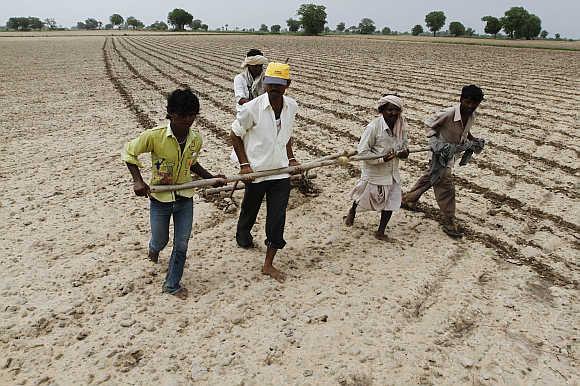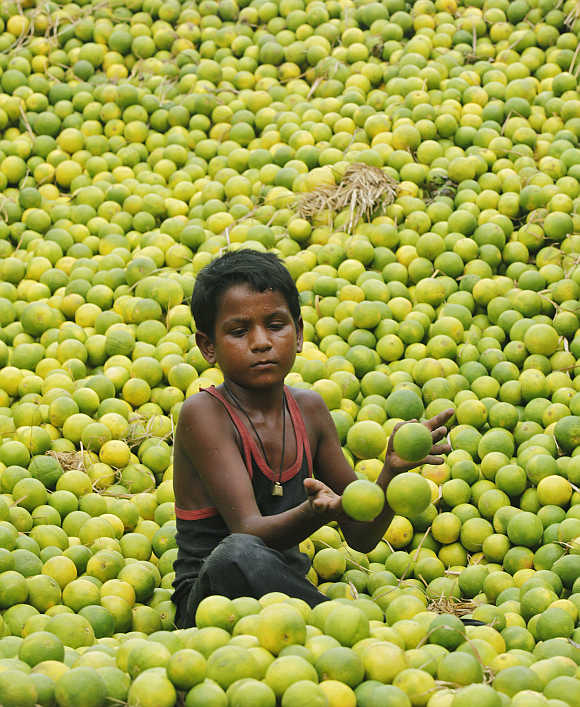Photographs: Adnan Abidi/Reuters. A K Bhattacharya
Whatever may be their flaws and the adverse impact on industry or the Centre's finances, the food security and land acquisition Bills are likely to be seen by voters as people-friendly initiatives, says A K Bhattacharya.
A week is a long time in politics. That's what Harold Wilson is believed to have told his party colleagues while explaining how in the world of politics a lot of change can take place in a relatively short span of time.
That was in late 1964, and Harold Wilson was then Britain's prime minister. Today, several decades later, Congress President Sonia Gandhi may well share a similar thought with her party colleagues and say that a month is a long time in politics.
Yes, the Indian economy has seen dramatic movements in its key indicators in the last one month.
The Indian rupee fell by over 13 per cent in the last one month. This was no ordinary fall; it came on top of a decline in its value against the dollar by another 13 per cent in the previous three months.
The stock markets have remained subdued and volatile.
Economic growth in the first quarter of 2013-14 dipped to a four-year low of 4.4 per cent and inflation, based on the consumer price index, continues to remain high - close to double digits.
…
Food Bill: Boon for politicians, bane for economy
Image: Prime Minister Manmohan Singh with Sonia Gandhi and Rahul Gandhi.Photographs: Reuters. A K Bhattacharya
International developments such as the rise in crude oil prices, the crisis in West Asia, and the proposed rollback of the US stimulus measures have also made India's economic outlook pretty grim. Indeed, August 2013 should be remembered as a month that convinced everybody in the government and outside that the Indian economy is in deep trouble.
But that is not why the Congress president should believe that a month is a long time in politics. Rarely has Ms Gandhi shown any interest in or concern for economic issues. You can count the few occasions on which she has referred to fiscal deficit or even subsidies in her speeches in Parliament or at party forums.
It is, therefore, not the economy that is likely to cause the UPA leadership to believe that a lot has changed in a month.
Instead, it is the country's politics and the nature of political debate that would seem to have changed following the manner in which the Congress-led United Progressive Alliance government successfully pushed for the passage of two legislative Bills by the Lok Sabha last month.
…
Food Bill: Boon for politicians, bane for economy
Image: Sonia Gandhi talks to Prime Minister Manmohan Singh.Photographs: Reuters. A K Bhattacharya
The Bills on food security and land acquisition were long part of Ms Gandhi's political agenda.
She had been expressing her disappointment over their delay in recent months. In the current monsoon session of Parliament, therefore, she saw to it that they were passed in spite of the many interruptions in the proceedings in the Lok Sabha.
The Rajya Sabha, too, has passed the food security Bill and is likely to approve the land Bill in the next couple of days.
In the process, the UPA leadership would have ensured that it can go to town on these two major initiatives and exploit them for securing electoral benefits during the forthcoming polls - in four states in November and in the entire country next year.
Whatever may be their flaws and the adverse impact on industry or the Centre's finances, the Bills on food security and land acquisition are likely to be seen by voters as people-friendly initiatives.
…
Food Bill: Boon for politicians, bane for economy
Image: Farmers plough and sow cotton seeds in a field in Shahpur village, about 79km west of Ahmedabad.Photographs: Amit Dave/Reuters
In electoral battles, display of such initiatives can work wonders for the political party that can claim credit for having introduced them.
In 2009 elections, the UPA used to great effect the national rural employment guarantee scheme introduced in 2005 and the waiver of farmers' loans announced in 2008.
There is no reason to doubt that the food security and land acquisition Bills would be used by the UPA, and particularly the Congress, in their election campaigns for the coming elections.
The timing of the two Bills seems to be perfect from the UPA's point of view. There is a great deal of discussion and debate over the two Bills. Remember that none of the Opposition political parties could afford to be seen as scuttling the initiatives.
They raised objections, but in the end the Bills were allowed to be passed as they all realised that opposing such initiatives could cost them popularity and votes.
…
Food Bill: Boon for politicians, bane for economy
Image: Twelve-year-old Chatu collects lemons at a wholesale fruit market in Kolkata.Photographs: Rupak De Chowdhuri/Reuters
And if the direct benefits transfer scheme also rolls out in more districts, as is being promised, the UPA poll machinery can talk about yet another initiative aimed at helping the common man.
The point to be noted here is that the UPA leadership is now sharply focused on elections.
Its two Bills, in addition to the direct benefits transfer scheme and the proposed land reform policy aimed at protecting the rights of marginalised communities, can give its election campaign a powerful edge, particularly in large parts of rural and semi-urban India.
In 2009, it focused on rural jobs and farmers. For 2014, it seems to be focusing on food and land, along with a transparent method for transferring government money to the poor.
Ironically, it is a game that is likely to work even more effectively when the economy is in bad shape. What campaign the Bharatiya Janata Party chooses to adopt for 2014 will, therefore, be closely watched.







article